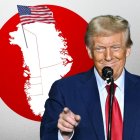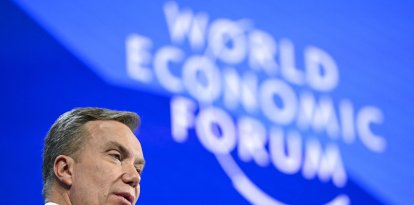Greenland holds general election amid Trump's interest in annexing the island
Denmark, which partially administers the island, has heightened the security level for the elections due to threats of foreign interference and the increasing pro-independence sentiment.

Attendees at a rally hosted by the pro-independence Naleraq party.
Next Tuesday, March 11, Greenland will hold early elections shaped by global politics and recent shifts in the White House. Elections in the autonomous Danish territory typically draw little attention, but former President Donald Trump’s calls for U.S. sovereignty over Greenland have thrust the island into the media spotlight.
Beyond Donald Trump's remarks, the elections are primarily a battle for the ruling socialist coalition to remain in power. Inuit Ataqatigiit, the socialist and pro-independence party leading the government, is once again projected to win on Tuesday, with polls showing it at around 30% of the vote.
Trailing behind is Siumut, another social democratic party that was Greenland's dominant political force until 2005. With a platform more aligned with mainland Denmark, Siumut is once again projected to finish second in Tuesday’s election. However, like Inuit Ataqatigiit, it appears to be losing ground to the opposition.
Leading the opposition in this election is the Democrats, a centrist party that rejects Greenlandic sovereignty and advocates for closer ties with Denmark. Polls show the party gaining eight percentage points compared to its 10% share in 2021, when it secured three seats in the current legislature.
Naleraq, an opposition party with a stronger pro-independence stance, is also performing well in the polls, reaching 16% of voter support.
Recent events have fueled a surge in pro-independence movements on the island, especially following Trump’s remarks, which reignited the debate over Denmark’s trusteeship of Greenland. If the socialists win, they are expected to once again consider holding a referendum on the issue.
Inatsisartut elections
Parties present candidates through an open-list system, allowing voters to choose both a party and specific individuals within it. Seats are allocated using the d'Hondt method, the same proportional system used in Spain, though Spain employs closed lists.
The party with the most votes attempts to form a government. If it lacks an absolute majority, it negotiates with other parties to establish a coalition. The leader of the ruling party typically becomes prime minister, officially appointed by the Danish monarch.
Greenland also elects two representatives to the Danish Parliament in separate elections. Despite its autonomy, it remains dependent on Denmark for defense, foreign policy, and economic matters.
The Greenlandic government and the Inatsisartut are responsible for various administrative areas, including education, health, fisheries, environment, natural resources, culture, justice, transport, housing, and social policy.
Greenland is "not for sale"
Since Donald Trump first publicly discussed the idea of annexing Greenland, the topic has become a recurring issue in Denmark and on the island. While the president’s statements have influenced the election campaign, they do not appear to have garnered a positive response from any major group.
As a bloc, all parties with a chance of entering Parliament after Tuesday's elections have rejected the White House's proposal, which was reiterated during Trump's speech before Congress last Monday.
Múte Egede, Greenland's premier, reaffirmed the island's sovereignty in response to Trump's speech before Congress. "Greenland is ours. We are not for sale and we never will be," declared Egede, who is once again running to lead the island's executive.
His coalition partner in the government, Aaja Chemnitz of Inuit Ataqatigiit, called it "very disrespectful" to refer to Greenland as a commodity and emphasized that such a decision would directly impact the Greenlandic people.
The opposition also strongly rejected the proposal, with Naleraq using the latest developments as a weapon against the Danish government and its opponents pushing unionist agendas. While rejecting the idea, party members went as far as to argue that Greenland at least had an alternative to relying on the Danish subsidy.
Foreign interference
For these elections, Danish intelligence services have warned of potential attempts at electoral manipulation. In response, Greenlandic authorities have strengthened cybersecurity and increased surveillance of social media to combat disinformation and prevent external influence campaigns.
Specifically, the interference is believed to potentially come from Russia. In addition to security reinforcements, the Danish Parliament passed a law restricting foreign funding to local parties, which directly affects Greenland.
The military presence has also been ramped up, with the deployment of additional military forces.
Greenland's resources
However, the reserves—representing economically and technically recoverable resources—are estimated at about 1.5 million tons, according to the latest report from the U.S. Geological Survey (USGS).
While this figure is modest compared to the reserves of China (44 million tons) or Brazil (21 million tons), it is still enough to attract industrial interest, particularly from those looking to diversify their sources of supply in light of China's dominance.
These rare earth materials are used in a variety of high-tech components, such as drones, wind turbines, hard disks, electric car engines, telescope lenses, and fighter planes.



























